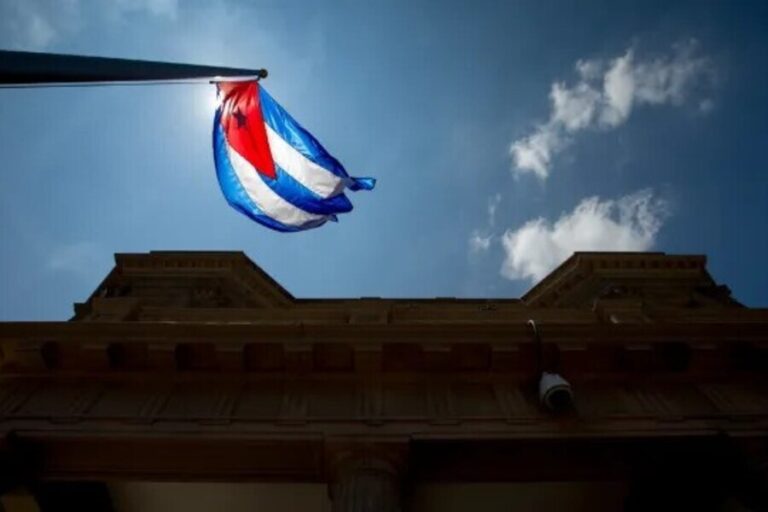The Trump administration has announced plans to revoke a key immigration program that has allowed hundreds of thousands of migrants from Cuba, Haiti, Nicaragua, and Venezuela to live and work legally in the United States. The program, which granted temporary parole status to migrants from these countries, is set to be formally terminated 30 days after its notice is published in the Federal Register on Tuesday.
According to the Department of Homeland Security (DHS), the parole program was initially designed to address humanitarian concerns and ease pressure along the southern border. Under the Biden administration, the program provided legal entry and work authorization for more than 532,000 individuals between 2022 and 2023, based on data released by U.S. officials.
However, DHS Secretary Kristi Noem stated that the CHNV parole program — named for the initials of the four countries — failed to meet its objectives. In a statement accompanying the notice, Noem said the program “did not result in a sufficient and sustained improvement in border security” and instead created new challenges related to the enforcement of immigration law within the interior of the country.
Noem further argued that the influx of migrants under the program has placed a significant burden on local communities, including increased competition for public resources such as housing, food, transportation, healthcare, and legal services. She also pointed out that minor parolees have been eligible for federal benefits like food stamps and Medicaid, exacerbating strain on local and state systems.
The revocation of CHNV parole is part of a broader push by former President Donald Trump to reassert his hardline immigration agenda. On his first day in office, Trump signed an executive order aimed at strengthening border controls, including directives to begin dismantling humanitarian parole programs. His administration has since revived those efforts in pursuit of stricter immigration enforcement and mass deportations of individuals without lawful status.
The decision also coincides with renewed efforts by Trump to target criminal activity among migrant populations, particularly Venezuelan nationals allegedly associated with the gang Tren de Aragua, which the administration has designated a foreign terrorist organization. However, critics argue that the blanket termination of the program unjustly punishes law-abiding families and individuals who entered the United States through legal processes.
Immigrant advocacy organizations have condemned the administration’s actions as discriminatory and politically motivated. Guerline Jozef, executive director of the Haitian Bridge Alliance, called the decision “a war on poor, Black and Brown people who dared to seek safety.”
“These families have followed the rules. Now they are being told they’re no longer welcome because Trump wants to rally his base with racist fear-mongering,” Jozef said in a public statement.
The announcement has sparked widespread concern among migrants who now face an uncertain future. Without parole status, they will lose their authorization to work and may be subject to deportation unless they qualify for another form of relief. DHS has stated that affected individuals will need to depart voluntarily or risk being forcibly removed by federal authorities.
Legal advocates are already preparing challenges to the decision. Several lawsuits are pending in federal courts aimed at preserving similar protections under the Temporary Protected Status (TPS) program, which also grants legal presence and work permits to nationals from countries experiencing humanitarian crises. An estimated 600,000 Venezuelans and 500,000 Haitians currently benefit from TPS, according to advocacy groups.
A federal hearing on the Haitian TPS case is scheduled for April 1 in Massachusetts, and another hearing for the Venezuelan case is set for April 3 in northern California. Attorneys representing plaintiffs are pushing to expedite the sharing of government evidence as they seek to block the termination of the program.
Jose Palma, co-coordinator of the National TPS Alliance, labeled the Trump administration’s actions as “racist and inaccurate,” emphasizing that individuals under TPS are lawfully present in the country under federal protections. Palma argued that ending these programs threatens the safety and stability of communities already contributing to U.S. society.
Community leaders echoed similar sentiments. Viles Dorsainvil, a plaintiff in one of the ongoing legal cases and founder of the Haitian Community Help & Support Center in Springfield, Ohio, criticized what she described as persistent stigmatization by government officials. “Stripping us of our legal status is the latest attack on Haitians, and one that cannot be allowed,” she said.
Despite opposition, DHS maintains that the CHNV program has outlived its purpose and must be ended to restore order to the immigration system. The administration contends that parole was originally intended as a short-term solution, not a pathway to permanent residency.
In her Federal Register filing, Noem noted that the program “traded an unmanageable population of unlawful migration along the southwest border for the additional complication of a substantial population of aliens in the interior of the United States without a clear path to a durable status.”
The termination of the CHNV parole program will leave tens of thousands of migrants in legal limbo. Many arrived legally under the previous administration’s initiative and established lives in the U.S. — securing employment, enrolling children in school, and integrating into local communities. With the program’s expiration looming, these families now face the real possibility of separation or removal.
While DHS has not yet detailed specific plans for deportations, the agency has advised that individuals currently under CHNV parole should prepare for the expiration of their status in the coming weeks. Notices of the revocation will be distributed beginning Tuesday, launching a 30-day countdown before enforcement measures begin.
As the April deadline approaches, migrant families, legal advocates, and civil rights organizations continue to push for alternative solutions — and prepare for an uphill legal battle against what they see as one of the most consequential immigration reversals in recent years.
